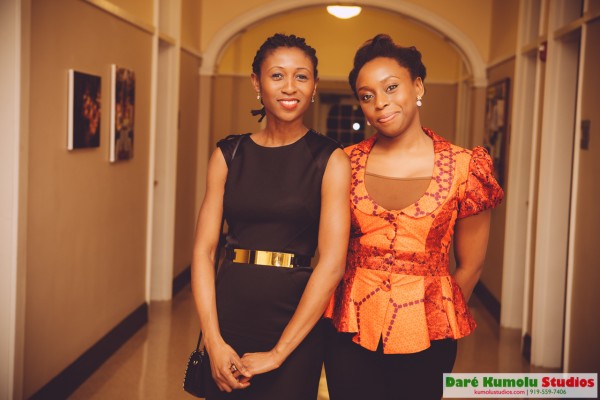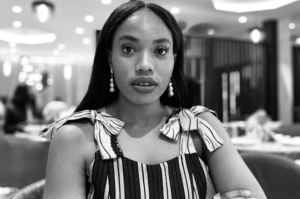Adichie’s visit was jointly sponsored by Duke Africa Initiative, Center for African and African American Research, and the English Department. In her talk, she reflected on two classic forms of narrative—fiction and memoir—and helped us think about how one is implicated in the other.
Apparently, she’s been working on and off on several memoir pieces, one of which she shared with us. It was a piece about mourning the loss of a beloved uncle. Here is a tiny bit to show you how powerfully evocative her writing was of that strange and dark feeling called melancholy:
Uncle Mai’s death brought to me the exquisite terror of confronting other losses and so, during the weeks that led to the funeral, I fearfully watched my father. My almost-80-year-old father. He played his role well, the stoic one in charge of things. When asked how he was doing, he would say cryptically, “Nobody is made of wood.” His entire focus was on arranging the ikwa ozu. The word “ozu” means corpse while “ikwa” is, depending on the context, to mourn or to sew, and as a child the expression “ikwa ozu” terrified me, brought amorphous ghoulish images to mind: the sewing of a corpse. It took a while before I understood that it meant a collective mourning, a funeral.
After she spoke, I and Prof. Ian Baucom interviewed her up on stage prior to the general Q&A.
Adichie has often talked about how in writing Half of a Yellow Sun, especially in making sense of her archive, she had to navigate the difference between what is “factually correct” and “emotionally true.” Professor Baucom’s first question referenced this distinction. He recalled a moment in the novel when Olana returns from having witnessed the massacre of Igbos in the north. “[Odenigbo],” quotes Baucom, “used massacre when he spoke to his friends, but never with her. It was as if what had happened in Kano was a massacre but what she had seen was an experience.”
Baucom then asked: “Is the difference between what history knows as “massacre” and what the novel finds a way to share with us as a “seen experience” connected to the difference between the factually correct and the emotionally true? Is that the same thing as the relationship between the work of the historian and the work of the novelist? Or is that distinction too easy?”
In her response, it was clear that Half of A Yellow Sun is a novel built around the task of moving beyond the facts of an event. Adichie sees bare facts as radically incomplete things. Even where they are abundant and overflowing, there is always something missing. The private, subjective dimension of experience—especially with regard to extreme violence—is something that is not always present in the documents that make up the official archive. As exhaustive as her archival research on the war was, it was her ability to inject the heap of official reports, newspaper clippings, books, songs, etc with a human element that made the story. There are two ways to give an account of violence. One is the official, often staged and grand narrative of war, revolutions, and so on. The other is a subjective, personal account that captures all that is contingent and ambiguous about acts of violence. Interrupting or undermining the first with the second is partly what comprises the work of the novelist.
Right around when Adichie came to Duke, Nigerian bloggers were still nursing wounds from the fight over Achebe’s memoir, There Was A Country. I wanted to get her take on the book, so I asked her what she thought accounted for the difference in reception between Half of a Yellow Sun and Achebe’s memoir? Why was her novel so overwhelmingly embraced while Achebe’s account was received with slightly more hesitation?
I was struck by two things she said. First that Achebe’s short story collection, Girls at War, is a somewhat more beautiful account of the war than the memoir. The difference between the stories and the memoir is for her a testament to the way in which fiction can do a certain kind of narrative work that memoirs cannot. She also recalled how when she read the memoir, she longed to get more of Achebe’s own private and subjective experience of the war and the ordeal surrounding it. In a sense, if there was anything missing from the memoir it was Achebe himself.
At the end of the evening, she and two friends who accompanied her on the visit met up with me and a few of my professors for dinner. I had attended many of these post-lecture private dinners but had never been to one that was this fun.
We ate, laughed, and talked about all sorts of things—random, silly, fun, quirky and intelligent nothings— till almost midnight. We only called it a night when we realized that we were the only ones left at the restaurant and that the serving staff were clearly ready to move on with their lives.
Within the context of social media soundbites and controversies, people often appear in ways that do not reflect their true selves or, at least, show their many-sidedness. In the recent Adichie-Elnathan brouhaha, Adichie was criticized for being stuck-up and insensitive. And I’m not going to say that her comments did not encourage such a criticism. But my encounter with her revealed a quite different person. She’s chill, funny, and has a delightful disposition. It is one thing to have strong views about things. It is quite another thing to be able to express them with swag and intelligence. She does both. I was also struck by how much of a Naija-girl-next-door she is, down-to-earth, the kind of person with whom you can talk just about anything—books, boys, hair, lipstick. And yes, we did talk about books, boys, hair, and lipstick.
[Check out photos from the event HERE.]










Stunning Photographs of Chimamanda Adichie’s Visit to Duke University | Brittle Paper August 06, 2013 13:17
[...] [Read my thoughts on the event and on meeting Adichie HERE.] [...]